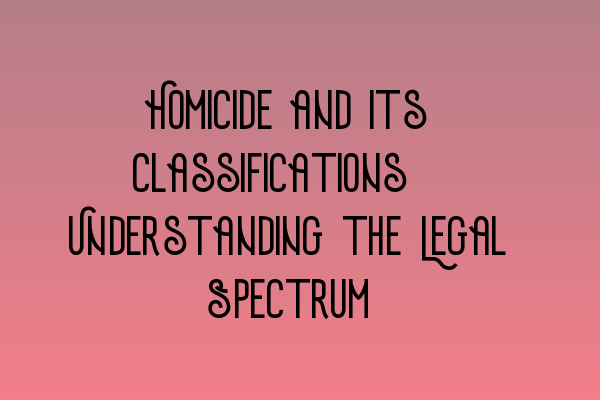Homicide and its Classifications: Understanding the Legal Spectrum
When it comes to criminal law, homicide is a term that is frequently used but often misunderstood. In its simplest form, homicide refers to the killing of a human being by another human being. However, within the legal system, homicide is further classified into different categories, each with its own legal implications. This blog post aims to shed light on the various classifications of homicide and provide a comprehensive understanding of the legal spectrum.
1. Murder
Murder is considered the most serious form of homicide. It involves the intentional killing of another person with malice aforethought. Malice aforethought refers to the intent to cause serious bodily harm or to kill, and the act is committed with deliberation, premeditation, or extreme recklessness. To prove murder, the prosecution must demonstrate the presence of both the actus reus (the guilty act) and the mens rea (the intention to commit the crime) beyond a reasonable doubt.
If you’re preparing for the SQE 1 exam, it’s crucial to be familiar with murder cases and the relevant legal principles. You can practice your knowledge by attempting SQE 1 Practice Exam Questions and SQE 1 Practice Mocks FLK1 FLK2 to test your understanding of murder-related topics.
2. Manslaughter
Manslaughter is another type of homicide that differs from murder in terms of intent and level of culpability. It involves the unlawful killing of another person, but without malice aforethought. Manslaughter can be further classified into two categories:
a) Voluntary Manslaughter: This occurs when the defendant kills another person in the heat of passion, often in response to provocation. The provocation must be reasonable, and the defendant’s actions must be a result of the provocation.
b) Involuntary Manslaughter: This occurs when the defendant causes the death of another person unintentionally, either through criminal negligence or while committing an unlawful act that is not inherently dangerous.
If you’re studying for the SQE 2 exam and want to enhance your knowledge of manslaughter cases and legal principles, it’s recommended to enroll in SQE 2 Preparation Courses that cover relevant topics in detail.
3. Infanticide
Infanticide is a unique category of homicide that applies specifically to the killing of a child aged under one year by their mother. It recognizes that the offender may be suffering from a severe postpartum mental disorder at the time of the offense. In infanticide cases, the court takes into account the defendant’s mental condition and the unique circumstances surrounding the offense.
For aspiring solicitors studying for the SQE 1 exam, it’s crucial to have a solid understanding of infanticide laws and cases. You can find comprehensive preparation courses here to enhance your knowledge in this area.
4. Justifiable Homicide
Justifiable homicide refers to killings that are considered lawful and justified under specific circumstances. This can include actions taken in self-defense or defense of others when faced with an imminent threat of death or serious bodily harm. The law recognizes that individuals have a right to protect themselves and others, but the response must be proportionate to the threat faced.
To navigate the complex legal principles surrounding justifiable homicide, it’s essential to stay abreast of relevant cases and legal developments. It’s recommended to regularly review SRA SQE Exam Dates to stay updated with current legal topics.
Understanding the different classifications of homicide is crucial for any aspiring solicitor specializing in criminal law. By grasping the legal spectrum, you’ll be better equipped to analyze cases, defend your clients, and navigate the intricacies of the criminal justice system.
To improve your understanding of criminal law as a whole, including homicide classifications, it’s important to engage in comprehensive study resources and practice exams. This will ensure you are well-prepared for the SQE exams and can confidently apply your knowledge in real-world scenarios.
At SQE Criminal Law & Practice Law UK, we offer a range of preparatory courses and practice materials to help you excel in your legal career. Book your course today and take the first step towards becoming a successful criminal law solicitor.
Note: This blog post provides a general overview of homicide classifications and should not be considered as legal advice. For specific legal matters, consult with a qualified solicitor.
